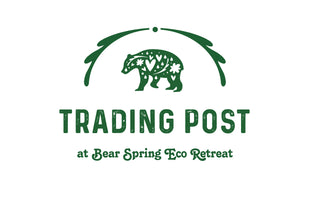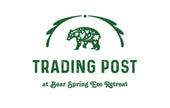Farm to Table Glamping

I get approached by financial planners offering their services on a pretty frequent basis. Most assume that I must be wealthy because of the beautiful, almost 300 acre property that we are building our eco retreat on. Legally, my Mom is the owner of our family farm. I’m just lucky to have been born into this family. It is with great privilege that this property was inherited from my grandparents making us land rich but not wealthy. My Mom worked as a clerk and my Dad as a teacher. Both are retired now. I’m an artist. It was my grandparents wish to preserve the forest on this property. My Mom could sell it for a good profit but that would mean it would likely get clear cut. We don’t want to see that happen. But we also don’t need all this land just for our exclusive use either. We do not live on an island. We live in a community.
In addition to the development of the glamping retreat, we are taking other steps to make the best use of the property in a way that preserves the integrity of the forest while giving back to the community. My parents have a farm assessment which helps keep the taxes lower. If you think the taxes are high for a house on a 50’ lot, imagine what 298 acres with two houses and a barn on it is?! To maintain a farm assessment, landowners must farm the land and the farming must generate a minimum profit. But, it doesn’t really matter who makes the profit. It could be a leaseholder farming the land.
My parents also have a managed forest designation. This assesses the land at a forest value which is not influenced by other market forces. The land is valued based on forest use only and not based on any other potential use. Land owners must also commit to good forest practices and comply with the legislated requirements of the Private Managed Forest Land Act. This allows us to choose to selectively log in a sustainable manner if desired.
This year, we established long term partnerships with two Young Agrarian farmers, a seed farmer and a nut tree farmer. Young Agrarians offers the B.C. Land Matching Program which provides land matching and business support services to farmers looking for land to start or expand their farm, and landholders, like us, interested in finding someone to farm their land. Young Agrarians understands that the high cost of land is a barrier for those seeking to enter the B.C. agriculture industry. We simply can’t do it all and creating these partnerships helps build our community and food security.
Mary Tress, the seed farmer, actually started farming here last year on a smaller plot. This spring we moved her into our upper fenced garden and she expanded her operation. If you were a guest at our retreat this summer, you would have enjoyed seeing her flowers blooming. Mary is an avid small-scale gardener-farmer, gratefully living and growing on our farm in the unceded territories of the Sinixt, Ktunaxa, and the Syilx.
Under the farm name Sunwild Seeds, Mary grows, shares, and sells seeds from a variety of open pollinated vegetables, herbs, and flowers, as well as cover crops. She began farming in 2014, and has been learning about local food ever since. She has a Graduate Certificate in Sustainable Food Systems and Security from Kwantlen Polytechnic University and a Bachelor of Arts and Science from the University of Guelph, in agricultural sciences and geography. She also works locally in waste reduction and resource management.

Mary with her huge squash harvest
This past week, we finished setting up a 60’ x 14’ hoop house that Mary will be using to grow next season’s crops.

Image of hoop house
Lucas Rivard, the tree farmer, joined us in the spring. He was born in Quebec and grew up in the Ottawa Valley on a first generation farm. Lucas learned about permaculture while visiting a friend in BC when he was 21. He realized how lucky he was to have access to a farm and to be able to grow food. He went back to Quebec and got a diploma in Horticulture. During these studies is when Lucas fell in love with fruit and nut trees. He planted a small orchard on his family’s farm over the spring of 2014 and 2015. It was very diverse with fruits, berries and nut trees. Eventually, with his brother, Lucas created a worker’s coop that ran for 4 more years. Long story short, and lucky for us, Lucas needed to transition out of the family operation where finally ended up in the Kootenays. Living here was his dream since the first time he visited in 2010. He is thrilled to be able to grow more diversity of food trees and to live amongst the mountains.

Image of Lucas
This spring, Lucas planted about 100 nut trees in our food forest. This forest, still in its infancy, now has over 150 trees ranging from pears and cherries to walnut and chestnut. This fall, Lucas will be planting another 100 hazelnuts. This is a long term project. Many of the trees will take eight to ten years to mature. In the meantime, following permaculture practices, we’ll be working together to add in a wide variety of plants including ground covers, edible herbs, shrubs, berries, perennial vegetables and flowers. Some, we hope to start selling in a farm stand as early as next year.

Hazelnut trees ready for planting
Our Young Agrarian partnerships fit perfectly with the overall vision for the development of the property. We are committed to our vision to create a beautiful, comfortable place to reconnect with the natural world celebrating the bounty that the forest has to offer while treading lightly upon the earth for a healthy, inclusive community where we can forage freely again. Humanity is no longer free to subsist in the forests. Almost all lands across the planet have been subject to enclosure of one form or another. And although some land is considered public, we are not free to take what is necessary for sustenance without payment or permits.
Most of us growing up as settlers will have a colonial perspective on land ownership. We view land as a commodity and generally favour exclusive rights to it. Indigenous peoples don’t see it that way. For indigenous people, land is regarded as sacred and alive. They do not regard their connection to the land as one of ownership but rather of of stewardship. They feel they have been bestowed with a responsibility for the land (and sea) and all of the creatures that inhabit the land with them. For example, “ingrained in each Salish community is the idea that the people are of the land and the land is of the people. These kindred spirits are alive and inseparable.” In the name of productivity, colonialism tried its best to remove these peoples from their lands. Yet, despite this terrible treatment, indigenous peoples are fighting to regain their rights to steward the land again. They are working towards a more just future for all of us where land and water is protected. We support this view and are working towards land stewardship that sustainably shares resources with other farmers and that will eventually enable our guests to have a ‘free to forage’ experience on our farm.
This year we introduced glamping meal kits in an attempt to reduce waste and emissions while closing the loop. Ingredients are grown right here on our farm or sourced locally from other producers in our region. Every meal kit purchased significantly helps reduce the amount of food packaging waste that our guests create. We are also able to collect the food scraps for our compost effectively creating a circular system as well as keeping more money in our local economy by sourcing from other local operations. In addition to our meal kits, we added a ‘salad bar’ this spring which is basically a kitchen garden that our guests are encouraged to pick freely from. This is an interim measure until the food forest fully matures and produces a surplus.

Image of guest 'Salad Bar' growing
In July, we obtained BC Green Certification. BC Green Business Certification is a program that supports businesses looking for practical and affordable ways to reduce their environmental impact and contribute to their local communities. To be honest, we did not need to take any action to meet the requirements as we are already doing them. Most of the actions necessary to qualify are already baked into our business plan. We were, however, able to improve our score by completing a few additional upgrades such as switching all our lightbulbs over to low voltage LEDs and providing bicycle racks.

Image of our glamping tents
By partnering with other farmers, maintaining a farm assessment, obtaining a managed forest designation, qualifying for BC Green Certification and developing the glamping retreat we are creating opportunities to make and share profits as well as opening up access to additional funding streams such as government grants. Government grants created specifically for tourism, agriculture, water and forest management will help us pay for much needed infrastructure such as septic and water treatment systems, build additional homes to house our farmers, build water storage for irrigation and perhaps even implement micro hydro power turbines making our operation 100% self-sufficient.
Our goal is to build a sustainable cooperative where we can both live and work growing food for us and our community. Every time you choose to stay at our glamping retreat, know that your dollars are funding our farmers and helping to develop a blueprint for local food production, sustainable land management and community building.


Great update article and great progress Solita!
Leave a comment